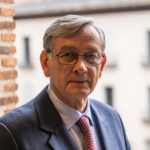Access to information is a fundamental pillar of democratic societies. Access to diverse and reliable sources of news and information allows all members of society to form opinions, participate in public debate and hold governments to account. It is also a cornerstone of peace. Sharing a common truth, based on accurate facts and data, is essential for conflict resolution through dialogue.
Information manipulation has long been part of the toolkit used by non-democratic states in times of conflict – but digital technologies now amplify the power of disinformation to influence and control public opinion, sow confusion and seed division, within and across national borders.
The Russian Federation’s attack against the democratic state of Ukraine was preceded by a steady outpouring of fabricated claims and unfounded allegations, conjuring false narratives to corrupt the information environment. It has also been accompanied by the silencing of dissenting voices online and offline.

Welcoming Words: Juan Lladó, President, Técnicas Reunidas; María Elena Agüero, Secretary General, Club de Madrid; Wendy Drukier, Ambassador of Canada to Spain.
Speakers: Danilo Türk, President of Slovenia (2007-2012) and President of Club de Madrid; Peter Loewen, Director of the Munk School of Global Affairs & Public Policy, University of Toronto.
Facilitators: Vicente Garrido, Director General, INCIPE and María Elena Agüero, Secretary General, Club de Madrid.
How should democratic nations respond? What international guardrails must be in place to contain disinformation as a weapon of warfare? How can international initiatives such as the Freedom Online Coalition, the Media Freedom Coalition and the US Summit for Democracy ensure that digital technologies advance rather than erode peace, democracy and human rights?
